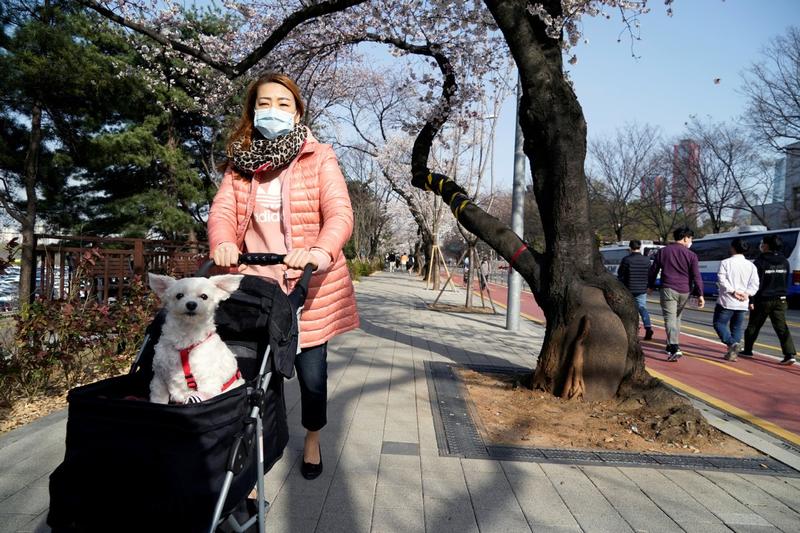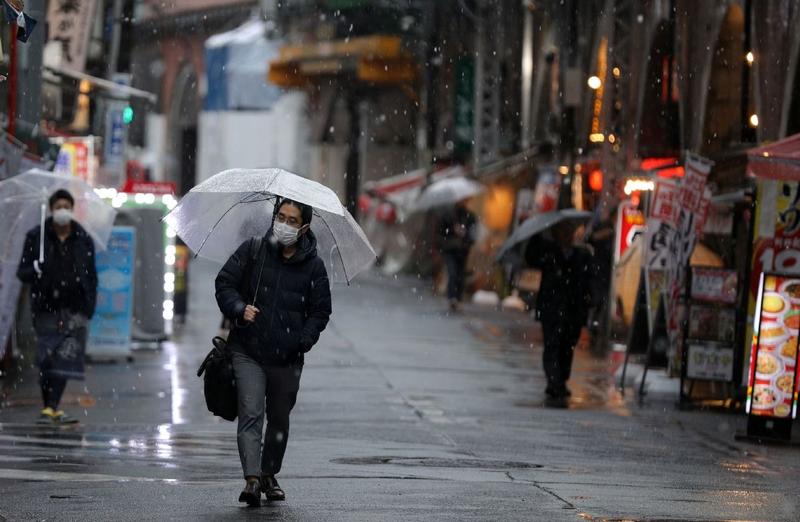Editor's note: Nations are collaborating in the fight against the novel coronavirus pneumonia outbreak to limit the damage to people's health and the impact on the global economy. Here, in the fifth part of a series titled "One World, One Fight", we look at how countries can work together.
 (LI MIN / CHINA DAILY)
(LI MIN / CHINA DAILY)
After working through the night, Ryan Hong Jun-seo finally goes to bed at 5 am.
But he only sleeps for five hours before resuming work on his website coronamap.live, an interactive map showing confirmed COVID-19 cases in South Korea.
Hong, 19, a computer science student at the University of Melbourne in Australia who is waiting to be called up for mandatory military service in South Korea, developed the website in early February.
Available in Korean, simplified Chinese and English, the site allows a user to check the number of confirmed cases, individual case details-such as a patient's nationality and gender-and routes taken within a certain radius of the user's location. It attracts tens of thousands of daily visits.
While the local population can obtain instant updates from Korean-language portals such as Naver, South Korea's largest search engine, Hong realized the 2.5 million foreigners in the country might not be so well informed.
Using technology, the KCDC numbered each confirmed case, released information about the hospitals patients are confined in, their activity routes before confirmation, and the epidemiological link with other patients
 A woman wearing a protective mask pushes a stroller with a dog as she takes a walk near a cherry blossom trees street, closed to avoid the spread of the coronavirus disease, in Seoul, April 1, 2020. (PHOTO / CHINADAILY.COM.CN)
A woman wearing a protective mask pushes a stroller with a dog as she takes a walk near a cherry blossom trees street, closed to avoid the spread of the coronavirus disease, in Seoul, April 1, 2020. (PHOTO / CHINADAILY.COM.CN)
ALSO READ: South Korean city of Daegu reports zero new coronavirus cases
Wang Sheng, a professor at Jilin University's Department of International Politics in Changchun, capital of Jilin province, said the South Korean government has done well in terms of providing timely updates and transparency of information.
"Using technology, the KCDC numbered each confirmed case, released information about the hospitals patients are confined in, their activity routes before confirmation, and the epidemiological link with other patients," said Wang, who has just returned from South Korea after an educational visit.
A range of apps have been created in South Korea to help the nation fight the outbreak, Wang added. The apps monitor people under self-quarantine, track confirmed cases and check the availability of nearby supplies of face masks.
Following a report on Feb 18 that the 31st confirmed patient in the country, a 61-year-old woman, had attended services at the Shincheonji Church of Jesus in Daegu, South Korea's third-largest city, the Christian group became the national epicenter of the outbreak, accounting for about 60 percent of infections.
Sharp rises of 500 or more in the number of new daily infections were reported as the government conducted thorough tests on all the group's followers. At the peak, more than 900 cases were confirmed, according to the KCDC.
But in less than two weeks, the number of new cases each day in South Korea fell to 100 or below.
The country has recorded around 100 or fewer daily new infections for more than three weeks. On Thursday, it reported only 39 new cases, bringing the total to 10,423, according to the KCDC. The mortality rate stood at 1.96 percent, up from previous days but still lower than the 3.4 percent average released by the World Health Organization.
Wang said he was impressed by the quick response taken by the South Korean authorities, especially with the focus on clearing confirmed cases, stringent quarantine measures and comprehensive testing.
He said some of the measures were similar to those adopted in China, including a makeshift medical facility set up in Daegu.
Wang also said South Korea had devised its own methods to control and prevent COVID-19.
"Since Feb 19, about 10,000 people a day have received tests for the novel coronavirus. The country has also devised many innovative ways to detect the virus, such as a drive-through test that can be completed within 10 minutes without the person being tested having to leave his or her car."
As of midnight on Tuesday, 494,711 people had been tested in South Korea, according to the KCDC.
John Linton, director of the International Health Care Center at Yonsei University's Severance Hospital in South Korea, noted the many achievements the country has made in the fight against COVID-19. He said a key reason for such progress was the experience gained during the outbreak of Middle East Respiratory Syndrome, or MERS, in 2015.
" (Back then), several hospitals had terrible transmission rates, so in the containment of MERS, there were a lot of practices (that have proven effective)," Linton said, pointing to the importance of avoiding cluster infections within hospitals.
As a tertiary center with 2,500 beds, Linton's hospital only has a few COVID-19 patients, who have been transferred from elsewhere in the country. But he said strict screening and prevention measures have been taken, including three safety clinics set up to screen people before they enter the main building.
If people have symptoms, or COVID-19 contact history, they will be sent to the testing center, he said. "The system is upgraded all the time. Many doors are locked in the hospital and only a few entrances are being used."
South Korea made early preparations to control and prevent COVID-19, and having the laws in place allowed the country to be quick and decisive when rolling out various measures, said Jerome Kim, director-general of the International Vaccine Institute.
The IVI is a non-profit organization based in Seoul, and established in 1997 at the initiative of the United Nations Development Programme.
Kim said the core of South Korea's success lies in the country's approach to test, isolate, track and treat people who are infected and who might be exposed to the virus.
"South Korea has a very vibrant biotech community and that's one of the reasons the testing was up-and-running so quickly," Kim said.
"The same thing applies in vaccines. Vaccines are a bit harder because it takes a bit longer to develop them ... but currently both large and small companies are involved in vaccine development in South Korea."
Linton said, "We are still worried about cluster infections," adding that such concerns are not just directed toward the Shincheonji religious group, but are aimed more at other churches that are refusing to cooperate or have their members go into self-isolation.
While the majority of churches have closed or are holding services on the internet, Linton said that about 10 percent of them are still conducting physical services.
ne of the country's most notable cases involves a cluster infection detected in the middle of last month. To date, about 70 people have been infected in Seongnam, 18 kilometers south of Seoul, after church officials sprayed saltwater into the mouths of members attending Sunday services, according to the KCDC.
Linton said spraying saltwater into the mouth for disinfection is "very strange on a scientific level," adding that the media criticism the church received "will help bring other churches around".
He said strong public opinion is conducive to bringing the outbreak under control.
"Koreans complain and grumble. There is a lot of unhappiness and hysteria about the virus, but at the end of the day, they all come around ... They do what they have to do."
Wang, from Jilin University, said South Korea's monoethnicity has resulted in a strong sense of ethnic cohesion within the country.
"Even though there are criticisms among different political parties, and friction between religious groups and the government, when the whole country is in crisis, people tend to make the common benefit of the nation a priority," he said.
Linton said South Korea's approach can be replicated in other countries, especially its innovative testing methods.
According to the Yonhap news agency, a South Korean company has agreed to ship 20,000 novel coronavirus testing kits to Romania in a government-arranged deal.
South Korea is considering providing humanitarian support to Iran and has discussed ways to jointly counter the pandemic with countries such as the Netherlands. It is also working with the WHO on clinical research on the novel coronavirus.
Noting that countries such as South Korea, China and the United States have all been working on developing a COVID-19 vaccine, Kim, from the IVI, said the world can expect to see results from the vaccine research as early as the fourth quarter, but the process of regulatory review and approval still remains.
Kim said the IVI is working in different ways to promote international collaboration in the field, including developing an international standard laboratory vaccine effectiveness evaluation platform and assisting companies in testing and analyzing the effects of the vaccine.
On March 13, the first videoconference was held on a joint prevention and control mechanism established by China and South Korea on coping with COVID-19.
A week later, a special videoconference on the disease was held by the foreign ministers of China, South Korea and Japan, during which the three countries agreed to jointly contribute to the global fight against the pandemic, according to the Chinese Foreign Ministry.
"Sharing information is always helpful," Linton said, adding that multilateral cooperation will be conducive for countering the pandemic.
Wang said the outbreak is a chance for the three East Asian countries to promote cooperation in non-conventional security fields, such as major regional public health incidents and climate mitigation.
"The close cooperation of China, South Korea and Japan in the battle against the pandemic demonstrates the increased cohesion among the three countries and the enhanced awareness of building a community of shared destiny in the region," Wang said.
Linton said he is cautiously optimistic about the situation in South Korea as the government works to contain the virus. He thinks the outbreak in the country will end by the summer, but not before. "We've got a long wait," he said.
 A man, wearing protective face mask, following an outbreak of the coronavirus disease, walks on a street during a snowfall in Tokyo, March 14, 2020. (PHOTO / CHINADAILY.COM.CN)
A man, wearing protective face mask, following an outbreak of the coronavirus disease, walks on a street during a snowfall in Tokyo, March 14, 2020. (PHOTO / CHINADAILY.COM.CN)
READ MORE: S. Korea coronavirus patients vote as general election kicks off
In addition to preventing cluster infections amid a rising number of imported cases, on April 1, South Korea began enforcing a two-week mandatory quarantine period for all arrivals from overseas, regardless of their nationality.
Yonhap quoted Yoon Tae-ho, a senior health ministry official, as saying that temporary shelters that can house up to 1,000 travelers have been prepared, enabling visitors to stay safe as they await test results.
Hong, the coronamap.live developer, has posted a message on the site asking for volunteers to help with translation.
Although the number of cases in South Korea has dropped significantly, he is still busy upgrading the system, which takes longer than updating routes of confirmed cases.
"There are 5 to 20 routes for each patient. ... When I first started, it took me a while just to upload one patient's route, but now it's about 10 times quicker, as I have tried to automate most of the work. I have also been adding a lot of features," Hong said.
"I just wanted everyone living in South Korea, including foreigners, to be aware of the coronavirus situation, so that they can have a better understanding of how to prevent it from spreading."


